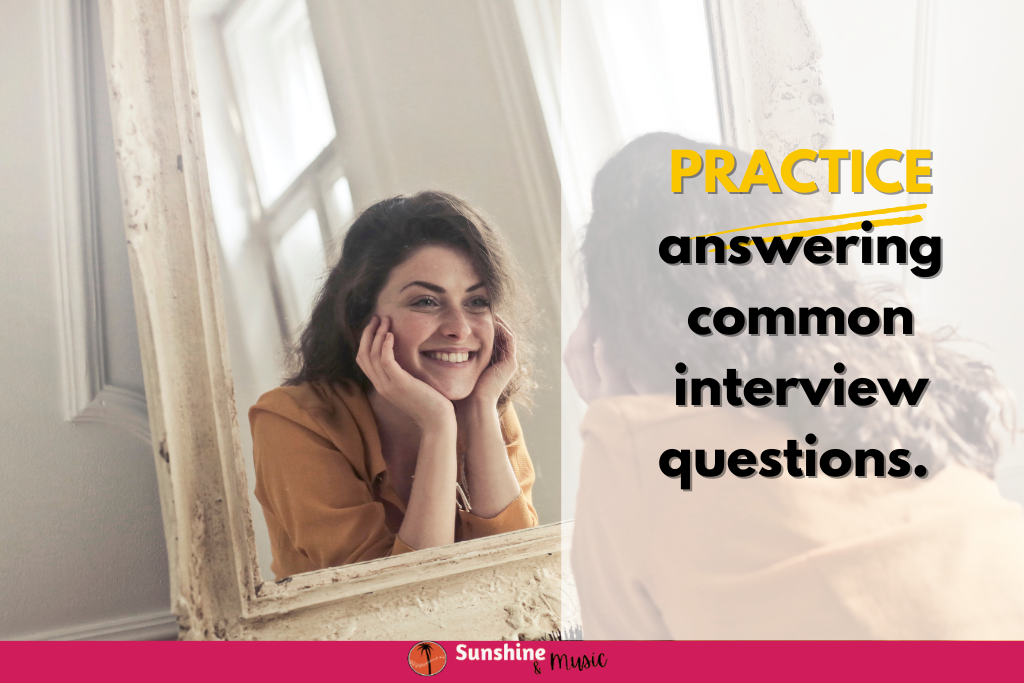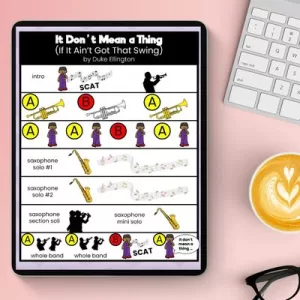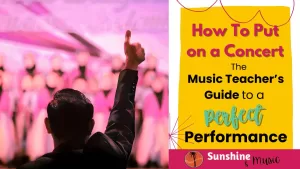Are you a recent grad looking for a music teaching job? Or perhaps you are back out on the job market for the first time in a while. This post will cover the steps before, during and after interviewing for a music teaching position. With the helpful tips I have included, you will be well on your way to landing that dream position and enjoying a rewarding career as a music teacher.
Recently I was back out on the job market, and had to think about interviews for the first time in quite a while. So, in honor of everyone who is currently going through the interview process, here are my suggestions for how to rock your interview and handle the job search process with grace.
Finding Jobs Teaching Music

Networking is Powerful
One of the most important things you can do as a job seeker is to network. This means reaching out to existing music teachers, music directors, or any other connections you may have. It is beneficial to attend music workshops and conferences to expand your network. Find your local musical chapter for Orff, Kodaly or other music pedagogies. You may find out through these networks of music teaching job openings. Not only will you build a great network but you will also gain highly marketable teaching skills.
You can look up local chapter at these websites:
Finding Music Teaching Jobs Near Me
Depending on where you are looking, this could be a very simple or a very tricky process. When I lived in Michigan, each city and town had their own separate tiny little districts, which meant searching each tiny little district separately for music teaching job posting. Believe it or not, I looked up every. single. district. that I was interested in applying to, and then each morning, checked every site to see if there were postings. I just had a document with all the links saved and went down the list and clicked them each morning.

In Florida, the process was MUCH smoother, as school districts are organized by county, so I only had a couple of sites to check each day. Checking every morning may sound over-the-top, but I assure you it is not. I know that when my old job posted, it was up only a matter of days before the teachers had been interviewed and a new person chosen.
Also you can check out state-wide or national organizations such as NAFME for postings, especially if you aren’t picky about where you teach and are willing to move.
Have Your Resources Ready to Fill Out Job Applications
Make sure that you have all the information on hand that you will need for the application. You will typically need a resume, previous employers and all their info – address, phone number, etc, references and their contact info, and possibly letters of recommendation. You should keep all of these things in a digital format. In this day and age, pretty much everything is done online.
Send an Email to the Principal About the Music Teaching Job

I always send an email to the principal after I have put in my application, to indicate my interest. You might write something like this (please edit to make it your own, but please feel free to use the general outline):
“Hello ____________________,
My name is ___________ and I am writing to you to express my interest in the music position posted at ___________________ Elementary School. Speak here a little about what interests you about their school/why you chose to apply there or think you would be a good fit. Keep it one to two sentences. I hope to get the opportunity to meet with you to learn more about ______________ Elementary School. I believe I would make a great addition to your team.
Sincerely,
___________________________”
Please remember – this is NOT you texting your friends! Keep it professional. Don’t use bc instead of because or forget to address the Principal by name and sign your name at the bottom. Formal. Not casual. This is your first impression and you want to look like you know what you are doing.
You Got the Interview! Now What?
What to Wear to a Teaching Job Interview
One rule I used to think I needed to follow is “You must wear a suit to an interview.” I don’t think a suit is necessary, but I DO believe that you should wear something that looks professional and slightly conservative. I usually make sure to wear a skirt that is knee-length or longer (if wearing a skirt) and if wearing a sleeve-less shirt, I opt for thicker (3-4 fingers wide). If I were a guy, I would probably wear a tie. The basic rule – wear something that make you feel confident. Also, this doesn’t mean you can’t wear a suit. If you have a suit you love, then definitely wear it. Just don’t feel like it’s your only option. (I know during a Florida summer, suits can feel a little ridiculous).

What to Bring to a Teacher Interview
I am a visual person and so I love portfolios. BUT, in my experience, interview committees don’t really use them a lot. I think it’s great to create one IF you can build it around talking points that will most likely come up during the interview (projects or performances you’ve done, behavior management, a special lesson). Otherwise, quite frankly it will probably be a waste of your time. But, if done right, it can be a useful enhancement to your interview.

Practice Music Teacher Job Interview Questions
Run through some of the basic questions that you may be asked, and have answers prepared. That way, you can easily answer those during the interview and can dedicate your brainpower to those questions that might pop up that take you off guard.

Here are some common questions I have had appear in music teacher interviews:
- Tell us a little about yourself and why you applied for this position.
- How do you handle classroom management?
- What does a typical lesson look like in your classroom?
- Tell us your thoughts about performances or rehearsals that happen outside the school day.
- How would you resolve a problem with a colleague?
- What was a challenge you had while teaching and how did you deal with it?
- How do you plan to communicate with parents?
- Why are you the best candidate for the job? *Sometimes they might just ask, is there anything else you would like to tell us? But make sure to turn it into a chance to convince them that you are the one. It’s basically your closing sales pitch*
How to Interview for a Music Teacher Job

Confident Body Language
Shake hands and greet each person on the committee with a confident handshake and a smile! During the interview, act confident (even if you are nervous!). Don’t worry! You know your stuff! You are just here to talk about what you do every day. Even if this is your first job, you have experience coming into this that is valuable. Maybe do a power pose before you go into the room, to help you feel like Superman or Superwoman.
How To Recover From a Stumper Interview Question
If this does happen, try and ask for clarification or turn the question into something you CAN answer. Or turn those stumper questions into a question for the interviewer, as a chance to learn more about their school. They aren’t there to TRICK you. They just want to learn about you. I always got hung up thinking there was a RIGHT answer to interview questions, and if I could only figure it out, I would get the job. There isn’t always a right answer. Just give YOUR answer. That is the right one (for you!).

Questions to Ask in an Interview
You probably have an idea of what you would like in a music teaching job. Ask about some of the things that might be deal breakers for you. Will you be teaching on a cart? How big are the class sizes? How many performances does the music teacher typically do per year? What size is the classroom and what type of resources does it have?
If you are an Orff person, maybe a classroom with no instrumentarium would be too big a hurdle to overcome. Maybe you are hoping for a SmartBoard. Ask. Now, if you are new to the teacher game, you might not know that salary is not typically negotiable, and can be looked up online ahead of time, so probably NOT worth bringing up in your interview.
One final BIG question that is definitely okay to ask is what is the timeline for the interview process. This will keep you from going crazy waiting to hear back. You will probably get a rough estimate, not an exact day.
What To Do After Your Interview
Thank Them – Immediately
As soon as you get home, send a thank you email. If you can, send it to all people involved in the interview, or if it was a huge interview committee and you can’t remember everyone’s name, the lead of the committee will work in a pinch. Sending a thank you is a quick way to show that you are serious about this job and that you are courteous.
Don’t Be a Bug-a-boo
They told you when they would get back to you. Now leave them alone. I know it’s hard! This may even mean waiting a couple days past when they estimated that they would make their decision. However, if you have gotten a job offer from another school, it is okay to contact the second school and see let them know you have an offer on the table, but are holding out from this position. When might they be able to tell you a yes or a no? Just make sure to frame it nicely, and it may hurry them along.
Also, if it has been significantly past the allotted time, and you are REALLY curious, you could probably contact the secretary to see if the position was filled. I usually don’t. I mean, if they were going to hire me, they would call, so basically for me it’s a no unless it’s a yes. Sadly, many (most) places will NOT call you to tell you that you were not picked.

DON’T GET DISCOURAGED!!
I know first hadn’t how taxing the interview process can be on your self-esteem. It can also be mentally and physically exhausting. Just know that there are many factors that go into picking a candidate for a music teaching job, and many are out of your control. Maybe they had a person in mind, but still legally had to interview multiple people. Or it may be possible that the school was not a good fit for you, and thats OKAY! Maybe the person after you had 20 more years experience. Don’t let these things make your feel like you are not still awesome and worthy of a great job.
More Useful Posts For Music Teachers
Music Lesson Plans: 10 Crucial Thing You Might Be Forgetting







